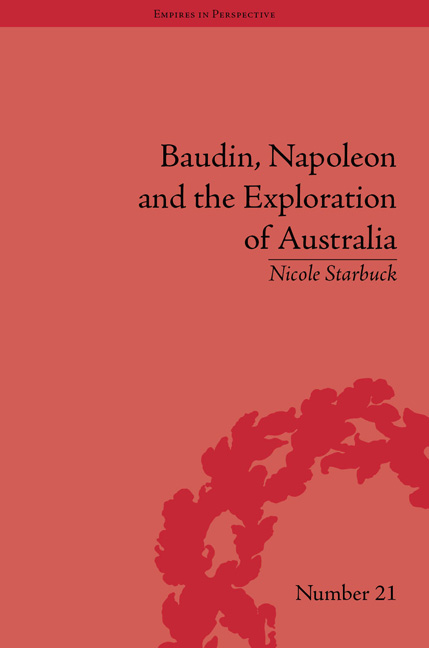Book contents
- Frontmatter
- CONTENTS
- Acknowledgements
- List of Figures
- Introduction: Voyaging out of the Enlightenment
- 1 Between Revolution and Empire: France and its Australian Voyage in 1800
- 2 ‘I Should Wish … to Establish a Few Tents on Shore’: The Port Jackson Stay
- 3 Disciplining Passions: French Naval-Voyagers at Anchor
- 4 The French and the British: A Diplomatic Relationship
- 5 Liberty, Equality and ‘Civilization’: Observations of Colonial Aborigines
- 6 Swans, Frogs and Rum: Natural History in an ‘Unnatural’ Space
- 7 Baudin's ‘New Expedition’
- 8 Epilogue: Voyaging into the Nineteenth Century
- Notes
- Works Cited
- Index
4 - The French and the British: A Diplomatic Relationship
- Frontmatter
- CONTENTS
- Acknowledgements
- List of Figures
- Introduction: Voyaging out of the Enlightenment
- 1 Between Revolution and Empire: France and its Australian Voyage in 1800
- 2 ‘I Should Wish … to Establish a Few Tents on Shore’: The Port Jackson Stay
- 3 Disciplining Passions: French Naval-Voyagers at Anchor
- 4 The French and the British: A Diplomatic Relationship
- 5 Liberty, Equality and ‘Civilization’: Observations of Colonial Aborigines
- 6 Swans, Frogs and Rum: Natural History in an ‘Unnatural’ Space
- 7 Baudin's ‘New Expedition’
- 8 Epilogue: Voyaging into the Nineteenth Century
- Notes
- Works Cited
- Index
Summary
Questions of honour, authority and status were just as vital to relations between the French and the British as they were to life aboard the ships of the Republic. While, on deck, officers vied for promotions, defended their pride, shared shipboard responsibilities and, at the end of the Revolution, struggled to reconcile equality with hierarchical order, across the Channel representatives of France and Britain fought for ascendancy, asserted their virtues, shared knowledge and, from 1793 until 1802, battled over liberty and empire. British forces had been the natural focus for the new Republican navy and, as the Revolutionary Wars came under the sway of Bonaparte in the late 1790s, Britain itself was threatened. Although the invasion did not eventuate, Bonaparte's Irish expedition of 1796 and Egyptian Campaign of 1798 were direct attacks on British imperial interests and, despite the clear superiority of their navy, the British soon found themselves at a disadvantage, without a continental ally. They were forced to accept the Treaty of Amiens in March 1802, and, still, little had actually been settled between themselves and the French. Just as Baudin did not conclude his mission when he anchored at Port Jackson but prepared for a new voyage, so French and British forces in Europe poised this year for the renewal of war. The ‘sciences were never [literally] at war’, but relations between the colonists at Port Jackson and their French guests were clearly underlaid by political anxieties – particularly on the part of the British. In the interests of peace between their nations and of the well-being of both the expedition and the colony, these anxieties needed to be negotiated via the utmost attention to diplomatic etiquette.
It was not just war itself that was critical to Anglo-French relations at this point in time, and especially to the relations at Port Jackson, but the particular nature of this war. Under the Directory, the French objective had begun to advance from ideological to imperial campaigns. During the late eighteenth century France had lost considerable colonial territory to the British: possessions in North America as well as India at the conclusion of the Seven Years War in 1763, Caribbean colonies during the Revolutionary Wars.
- Type
- Chapter
- Information
- Baudin, Napoleon and the Exploration of Australia , pp. 65 - 80Publisher: Pickering & ChattoFirst published in: 2014



